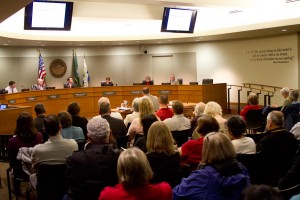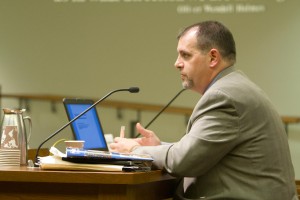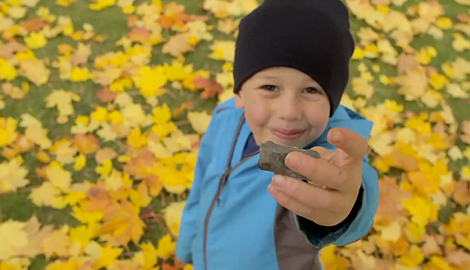Vancouver-Clark Parks and Recreation plans to cut 17 full-time positions and 500 recreational programs in an effort to address a projected $1.2 million budget shortfall this year.
Pete Mayer, director of Vancouver-Clark Parks and Recreation (VCPR), delivered the somber news Monday to a full house of spectators during a late afternoon workshop with the Vancouver City Council. Mayer said that in addition to the 17 layoffs, VCPR will reconfigure 11 more positions, bringing the total number of employees affected to 28.

Citizens packed the chambers of the Vancouver City Council Monday afternoon to learn of cuts to the Vancouver-Clark Parks and Recreation budget.
He didn’t identify departments in which layoffs would occur, saying he first needs to notify impacted employees over the next two weeks.
“Ultimately this has a dramatic, dramatic impact on our hardworking staff,” Mayer said.
Budget cuts have been a familiar occurrence at VCPR for nearly a decade. Since 2003 the agency has eliminated 35 full-time positions in both parks and recreation programs and reduced a host of programs as it cut $2.3 million from its budget. In 2010, VCPR had an operating budget of $16.1 million, with 95 full-time employees and 300 to 400 part-time and seasonal employees.
Mayer said this latest budget deficit is simply the result of fewer people paying recreational fees. VCPR operates the Firstenburg and Marshall Community Centers, Luepke Senior Center, Vancouver Tennis Center, Jim Parsley Center Pool, and Propstra Aquatic Center. It also manages 2,138 acres of parkland within Vancouver and 5,134 acres of parkland in other cities and unincorporated areas of Clark County.
Recreational fees make up 67 percent of the department’s budget, with the remaining 33 percent coming from the City of Vancouver’s general fund. Between 2010 and 2011, fee revenue plummeted from $6.9 million to $5.1 million, throwing budget projections completely off kilter.
“Our reductions are largely based on economic factors,” he said.
Examples of programs that will be cut include teen late nights, most special events and activities, and after-school programs. Plans to develop and build new parks are also on hold.

Vancouver-Clark Parks and Recreation Director Pete Mayer explains how his department will lose 17 full-time positions this month.
Mayer added, however, that he and his staff have preserved core services at 80 percent of current participation level, including programs for youth and seniors. In addition, no job cuts are scheduled in park maintenance or grounds keeping. He said the department will transition from a “buy and build” mentality to one focused on preserving and maintaining existing assets.
“This is a critical transition period going into a new biennial period where we must find a more sustainable mechanism for public parks and recreation and what that should look like,” Mayer said.
Council members were sobered by the news.
Council member Larry Smith, who was VCPR director from 1996 to 2003, said he sympathizes with Mayer’s predicament.
“It’s ugly and those who get involve with parks and recreation know where it is in the pecking order of those services,” he said. “It’s a business and we understand that if the revenues don’t come into support the programs, then those programs either go to somewhere else or you have to eliminate them.”
Smith asked if it might be feasible for VCPR to become more of a broker of services, rather than the primary provider, and farm out certain programs to nonprofit organizations. He also wants to engage the business community in finding a solution.
“It forces you to reach out to the business community in sponsoring various programs that they can do because they’re probably in a better position and making sure that we sell the value of parks and recreation, because it is economic development in the community,” he said.
Council member Jeanne Harris said it is the city’s job to provide services for people who can’t otherwise afford them. She said it is counterintuitive to cut after-school programs because even though they don’t pay for themselves they might keep kids out of trouble and eventually save money elsewhere, such as in public safety.
“The fact that we are sitting here and saying that Parks and Rec is now a business and it’s not paying for itself and therefore we’re going to cut back is a problem, because we’re not supposed to be a business. We’re government,” she said.
Harris isn’t keen on the idea of partnering with private businesses or depending too much on volunteers, but said she likes the idea of the city working with nonprofits.
“I think that is where we have some real opportunities with the city owning the assets and partnering with nonprofits to provide programming,” she said.
Council member Jeanne Stewart said that if VCPR pursues an enterprise model it might end up competing with other private recreational providers to attract users who could afford to pay, squeezing out those who couldn’t.
“Then it is the ‘haves’ that can participate,” she said.
Mayer said he and his staff plan on implementing recommendations of a blue ribbon commission that convened in 2010 to evaluate the future of VCPR. The commission was comprised of representatives from Battle Ground, Ridgefield, Vancouver, Camas, Washougal, and unincorporated Clark County to examine the future of VCPR.
Recommendations the commission made included expanding the use of volunteers, increasing user fees to cover costs, and encouraging partnerships between local government and nonprofits, schools and other parks and recreation providers.
Council member Jack Burkman said pursing the blue ribbon commission’s recommendations is the right direction to take, because the city simply doesn’t have any more money to offer.
“We can predict where this is going to go if the city of Vancouver is the only supplier,” Burkman said. “It’s not going to work.”
Mayor Tim Leavitt said it is ultimately up to the community to decide the fate of the VCPR.
“How much do we want to support those programs that we believe are so vital to the livability for everybody that is a citizen here?” he said. “We’ll know sooner than later what we have to do with our parks program, but it is a community question.”
 Related post (includes video):
Related post (includes video):
Community rallies to raise funds for Marshall Park









